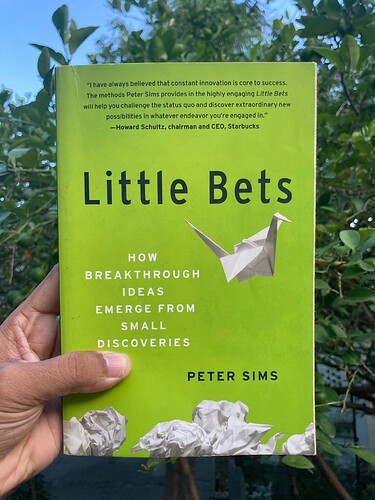Little Bets, Peter Sims, 2011 - This is an approach of planting several seeds in the face of uncertainty and seeing what works out. Instead of trying to predict the future and prepare projections, this approach acknowledges that the future is uncertain and the only way to find the right course is to experiment and nourish the positive bets. Actively followed by big tech in the last 2 decades, this approach has now made its way to mainstream thinking as well.
My notes -
-
Chris Rock tries hundreds of preliminary ideas in small comedy clubs and refines them over and over before a big show, say with David Letterman. His jokes, openings, transitions, and closing have all been tested rigorously by then. An hour long act takes stand-up comedians from 6 months to a year
-
Most successful entrepreneurs don’t begin with big ideas, they discover them (AdWords was one such discovery for Google). Bezos’ Amazon strategy is on similar lines of going down blind alleys or planting seeds and discovering what opportunities show up
-
You can’t predict how people are going to behave around a new product, so avoid spreadsheets and RoI calculations and elaborate financial predictions
-
Two types of innovators - Conceptual and Experimental. Conceptual ones like Mozart pursue bold new ideas and often achieve breakthrough early in life. Experimental ones are iterative, trial-and-error driven and are prone to setbacks and failure as they work towards success
-
When trying to do something new or uncertain, we rarely know what we don’t know. (When much is known, procedural planning approach works perfectly well)
-
Most productive creative people are rigorous, highly analytical, strategic and pragmatic (flies in the face of traditional assumptions)
-
We are educating people out of creativity - Sir Ken Robinson
-
Linear systems, Relentless efficiency, topdown control and eradicating failure (like in an assembly line) has left little room for creative discovery and trial and error
-
Tyranny of large numbers - there’s a natural tendency to think in terms of bigger bets as you get bigger (large orgs make large bets instead of several small bets)
-
Hewlett-Packard for many years got its ideas for new products by informally talking with Customers to identify new problems and needs, rather than market research
-
Affordable loss principle - Choosing what you are willing to lose in advance when making a bet (Most speculative risk:reward systems work this way)
-
Fixed vs Growth Mindset - Fixed mindset people believe that abilities and intelligence are set in stone, that we have innate set of talents, which creates an urgency to repeatedly prove those abilities. Growth mindset - Intelligence and abilities can be growth through effort, and failures or setbacks are opportunities for growth
-
People with fixed mindset gravitate towards activities that confirm their abilities (Am I going to be good at this immediately?), whereas with a growth mindset they tend to expand their abilities (Can I learn to do it?).
-
Students praised for their ability (wow, you are good at this!) chose easier tasks while those praised for their effort (wow, you worked really hard at this) chose challenging tasks. Praising ability reduces persistence while praising effort leads to growth mindset. Developing a growth mindset takes time and conscious effort
-
Failing quickly to learn fast - I won’t get it right the first time, but I will get it wrong soon, really quickly
-
Shitty first drafts, good second drafts, terrific third drafts (Anne Lemont who wrote Bird by Bird)
-
Prototyping can be counterintuitive - Doing in order to think, instead of thinking in order to do
-
Structured music to Improv jazz needs the part of brain that’s evaluating and censoring to be off
-
Plussing - concept used extensively at Pixar to improve ideas without using judgement language (people accept the starting point, before suggesting improvement, leading to positive environment)
-
Highest Paid Person’s Opinion (HiPPO) usually dominates how people make decisions inside most orgs (Equating status and money with intelligence and insight, when often there is no correlation)
-
People don’t know what they want, if they haven’t seen it - Jobs
-
Worm’s eye view - Looking at a problem closely on ground. Grameen Bank and microfinancing as a concept arose out of worm’s eye view of observing people
-
Lucky people tend to pay attention to what’s going on around them a lot more than unlucky people (and be open to opportunities)
-
Lucky people are effective at building a strong network of luck - building secure long lasting attachments with people they meet
This is a small book and there wasn’t much in it that I wasn’t aware of and so the fresh learning for me was relatively low. However, little bets is an important concept that’s more a practitioner’s art and perfecting it can take years of working with your mind to accept failures, developing a growth mindset, being curious to look at problems closely, developing a good network, experimenting a lot, staying open to feedback and thus inviting luck. 8/10

